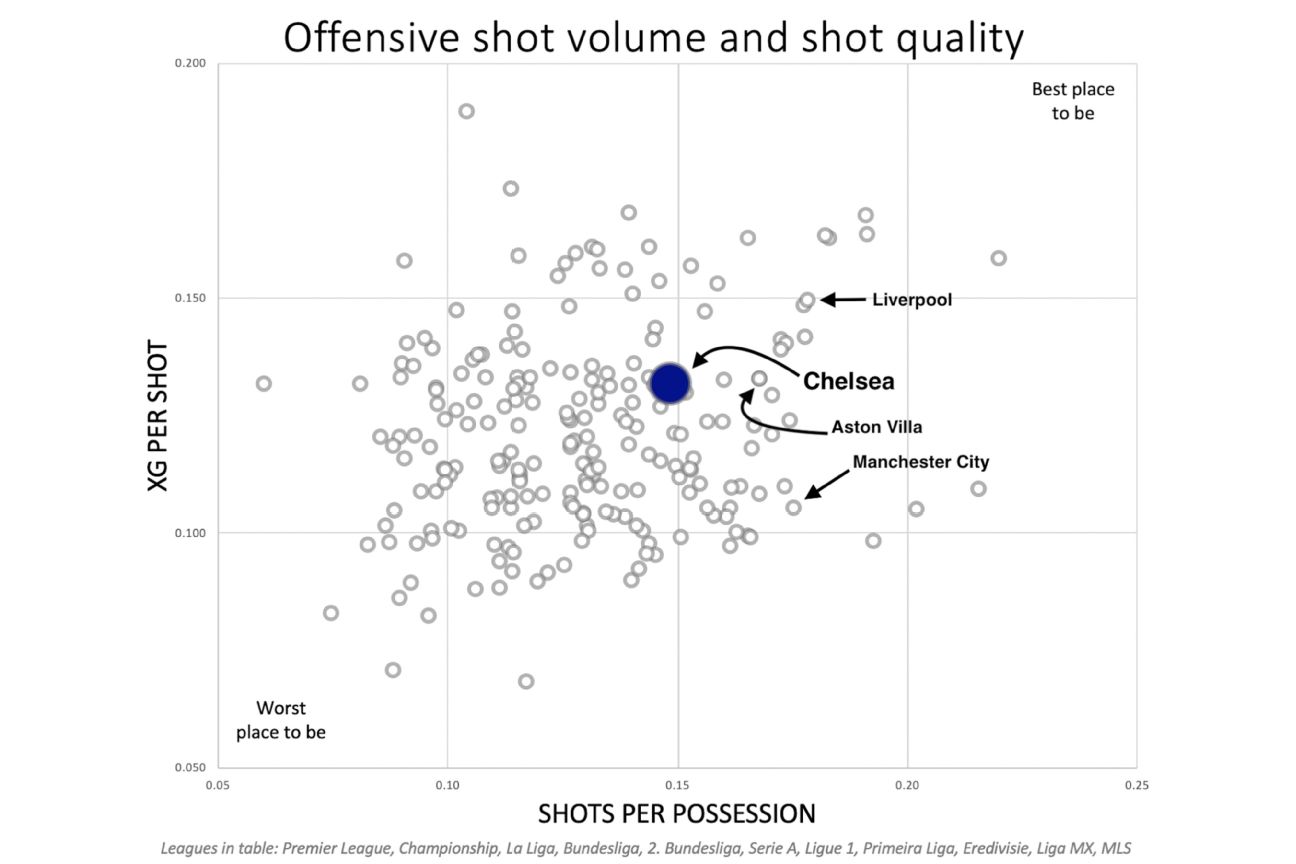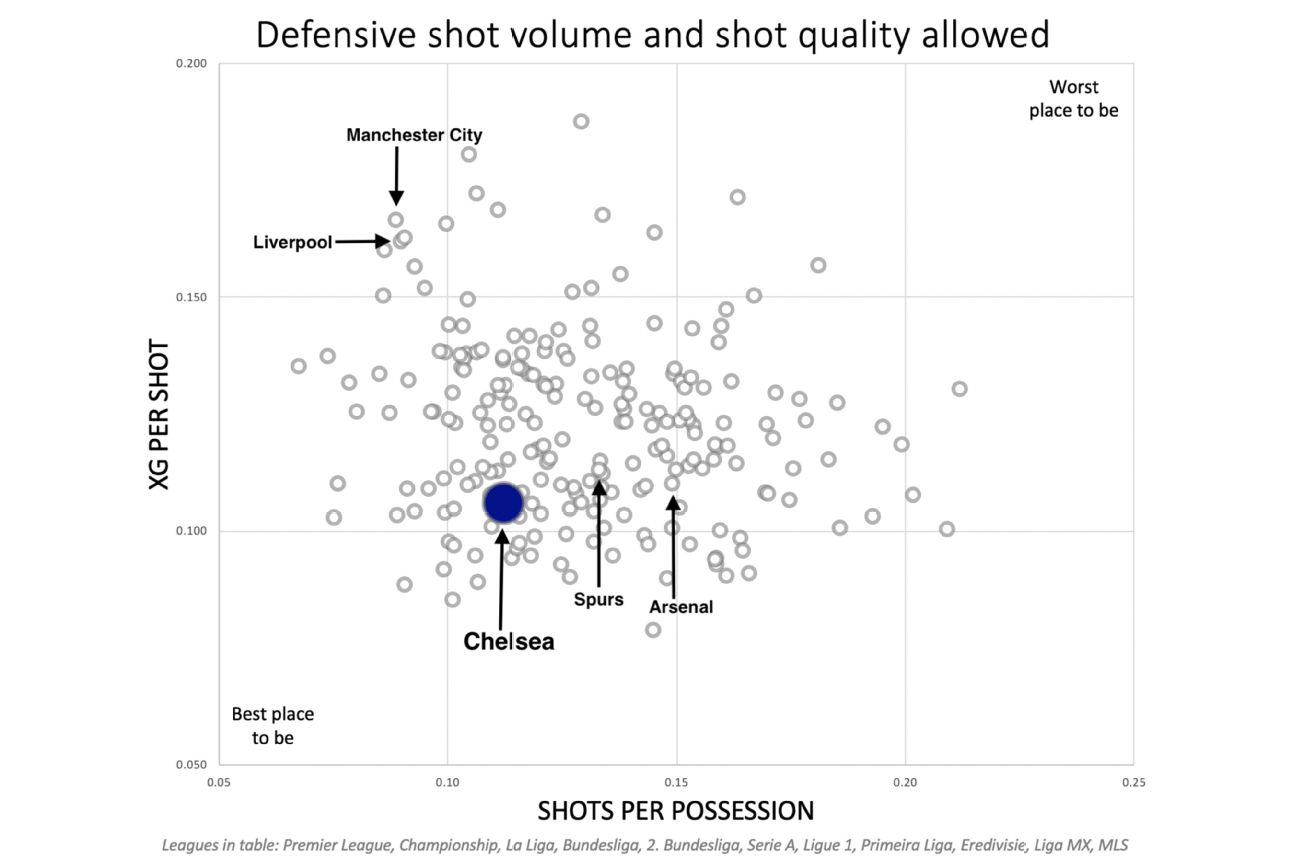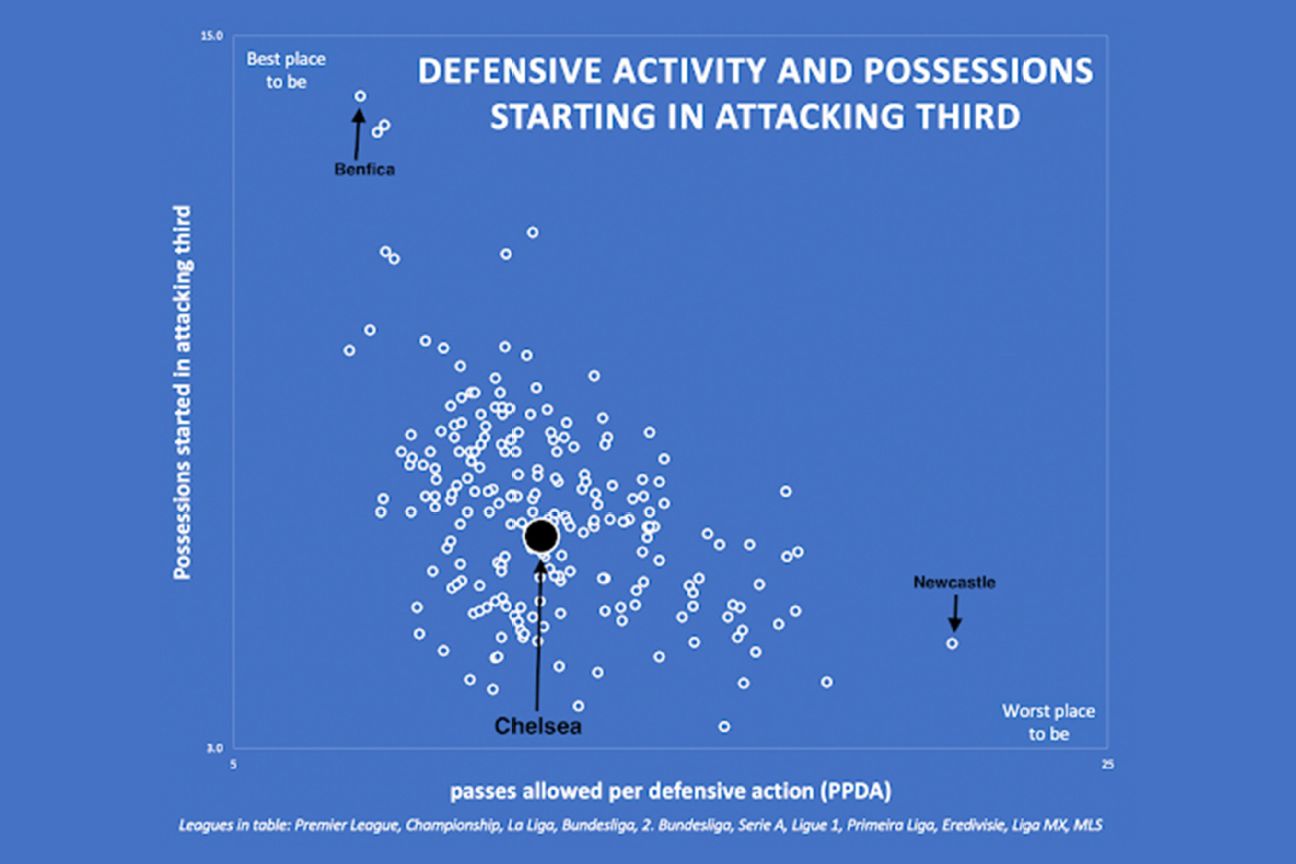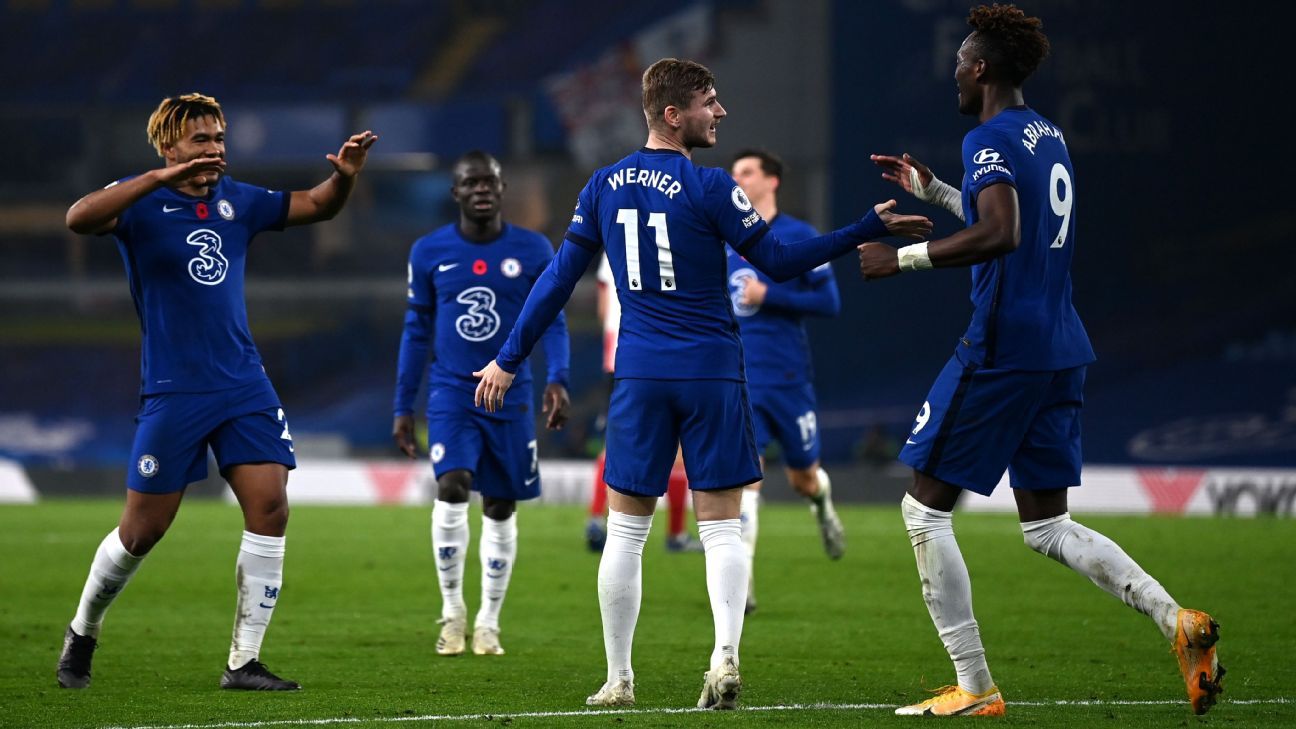Thanks to a 2019 transfer ban, Chelsea had spent an uncharacteristically low amount on new players of late. Owner Roman Abramovich changed that awfully quickly. He loaded up in the tiny offseason between 2019-20 and 2020-21, spending over £220 million on RB Leipzig forward Timo Werner, Bayer Leverkusen attacking midfielder Kai Havertz, Ajax winger Hakim Ziyech, Leicester City fullback Ben Chilwell and, later in the window, Rennes goalkeeper Edouard Mendy. The club brought in central defender and former Paris Saint-Germain captain Thiago Silva on a free transfer as well.
For anyone keeping score at home, that’s potentially more than half a lineup’s worth of new players for a team already good enough to qualify for the Champions League and reach the FA Cup finals. It’s an investment that’s naturally going to raise expectations.
The oddity: Werner, Havertz and Ziyech are all attackers. The Blues had finished third in the Premier League in goals scored but 11th in goals allowed, finding themselves with a Manchester City-like vulnerability to counterattacks and swift maneuvers. Could creating a glut of attackers create issues up front? Had they done enough to address the defense? Was manager and former Chelsea star Frank Lampard ready for the challenge of both expectations and a seemingly imbalanced squad?
All of these questions made Chelsea one of the more intriguing teams of the offseason. So let’s check in on how they’re doing ahead of a BIG match against high-flying Tottenham this weekend.
The season to date
Chelsea have played two different seasons so far. In the first, they managed just three wins in their first nine matches in all competitions, and one, a thrashing of low-second-division Barnsley in the League Cup, barely counts. Mind you, they suffered only one loss, too, a 2-0 defeat to Liverpool on Sept. 20. But they had gotten sucked into 3-3 shootouts against both West Brom and Southampton, with their defense showing familiar vulnerability.
– Stream ESPN FC Daily on ESPN+ (U.S. only)
– Predict results in ESPN’s English Soccer Pick ‘Em!
– ESPN+ viewer’s guide: Bundesliga, Serie A, MLS, FA Cup and more
Meanwhile, they were showing no initiative against the best teams on the schedule. They scored just one combined goal against Liverpool, Manchester United, Tottenham Hotspur (in the League Cup) and Sevilla (in the Champions League). Even considering that other elite teams were also failing to find traction with the nonexistent offseason and a crowded fixture list, this was undeniably disappointing.
On Oct. 28, however, Chelsea’s “second season” began. They’ve played six matches from that date on, all wins. They walloped Krasnodar and Rennes by a combined 7-0 in Champions League play and breezed through Burnley, Sheffield United and Newcastle United by a combined 9-1 in the Premier League. A return match against Rennes on Tuesday was less convincing, but a 2-1 victory clinched advancement into the UCL knockout rounds all the same.
That’s 18 goals scored and two allowed in six wins. A combination of sketchy competition and further familiarity allowed Chelsea to find their form and rack up some points. Chelsea are now third in the Premier League, just two points out of the top spot. Caesars by William Hill gives them +500 betting odds to win the Premier League, third best and equivalent to a 17% chance. In the Champions League, they’re the No. 8 favorite at +2000 (5%).
Is that worthy of the enormous transfer bill and payroll? Not quite, but they’re improving.
Chelsea are … fine. Good, even!
Breaking attacks into two qualities — shot volume (measured by shots per possession) and shot quality (xG per shot) — we see that Chelsea have been above average on the whole this season. Within the Premier League, the Blues are fifth in shots per possession (0.15) and while they’re 10th in xG per shot (0.13), they’re basically one or two decent looks from the top five.
Across lots of major leagues, you can see that Chelsea are solidly decent, if unspectacular.

Werner has been as good as advertised. He’s combined eight goals with three assists in 14 matches in all competitions, and while he suffered about the worst miss of his life against Rennes on Tuesday, we’ll just call that an xG course correction — he was overachieving compared to his xG figures a bit, and now he’s not as much.
The production has been well spread, though. Havertz has added four goals and two assists in 10 matches, and Chilwell and Ziyech have each added two goals and three assists. Ziyech has done so in just nine matches. Chelsea’s surge nearly coincided with his post-injury introduction into the lineup.
Injuries to Ziyech and Christian Pulisic, among others, allowed Lampard to spread the minutes around to attackers, and lots of players have done well in smaller samples. Striker Tammy Abraham has scored five goals with four assists in just under 700 minutes, winger Callum Hudson-Odoi has scored three times and created nine chances in just over 500 minutes, and veteran striker Olivier Giroud, limited to just 178 minutes in all competitions, has still scored twice and created four chances. Both Hudson-Odoi and Giroud scored against Rennes on Tuesday, which affirmed both how many strong attackers the team has and how tricky minutes distribution will be when everyone is fully healthy.
Defensively, it’s almost exactly the same story. The Blues are fifth in the Premier League in shots per possession allowed (0.11) and a solid third in opponents’ average xG per shot (0.11). In the defensive chart below, where the bottom left is the best place to be, you can see that they’re doing quite well over a wide swath of leagues.

Chilwell has been as good as advertised, while central defender Kurt Zouma‘s play has been outstanding despite a rotating cast of characters next to him (Silva, Andreas Christensen, Antonio Rudiger). When the 36-year-old Silva is in the lineup, his vocal presence is noticeable; it might bear mentioning that Chelsea have allowed just four goals in his nine appearances, and three came early on against West Brom.
Midfielders Mason Mount and N’Golo Kante have played a clear role here, too. Mount has been key to the defense-to-offense transition, and Kante is a one-man counterattack destroyer. That he has been healthy so far this season, after injuries tamped down his form last season, has made a massive difference.
Meanwhile, Mendy has been a definitive improvement over Kepa Arrizabalaga, who continues to battle one of the most high-visibility crises of confidence you’ll ever see. To date, those track meets against West Brom and Southampton appear to have been outliers.
On average, the offense has been fine and the defense has been good. Only that doesn’t tell the whole story.
1:18
Steve Nicol praises Thiago Silva’s impact on Chelsea’s defense, and calls out Timo Werner’s miss vs. Rennes.
The two Chelseas
During his storied career, Lampard played for multiple seasons under four managers: Harry Redknapp for six seasons (at West Ham United), Jose Mourinho for four, Claudio Ranieri for three and Carlo Ancelotti for two. It’s safe to say he learned from plenty of others — his father, Frank Sr. (a former West Ham star and assistant); former Chelsea managers such as Luiz Felipe Scolari or Roberto Di Matteo; his final NYCFC boss, Arsene Wenger tree branch Patrick Vieira; etc.
But if you tried to piece together the characteristics of a coach influenced primarily by Redknapp (his uncle), Mourinho, Ranieri and Ancelotti, you would come up with a somewhat contradictory picture.
— Man management abilities: This is a quality perhaps most closely ascribed to both Redknapp and Ancelotti. Redknapp was never exactly known as a tactical genius, but he had an eye for talent and got talented players to play hard. Ancelotti is further up the tactical chain, but his primary ability has usually been managing the ego of extremely talented players. And hell, by playing a majority of his career on one of the most expensive clubs known to man, Lampard has been exposed to all sorts of different approaches in this regard.
— An attacking ethos … Both Redknapp and Ancelotti are typically associated with this, and while Mourinho most certainly isn’t, I never tire of pointing out that his Real Madrid hold the single-season goal record for La Liga. When he’s got goal scorers, he makes sure they’re in position to score goals.
— … and a ferocious defensive structure. Mourinho’s first two Chelsea squads allowed 37 goals combined. Most of Ranieri’s most successful stints have involved defense-first squads, from Chelsea to Monaco to the Leicester City team that won the Premier League allowing under 1 goal per match.
Lampard’s first Chelsea team primarily tried to play a traditional possession game when they could get away with it. They played home-and-homes with 23 teams in the Premier League and Champions League and had a combined possession rate over 55% against 15 of them, including Manchester United (58%) and Arsenal (58%). They couldn’t compete in this regard against Manchester City (44%) or Bayern (37%), but they still managed a fun 2-1 win over City in late June. This hinted at increasing flexibility from a young manager in only his second season in charge of a club.
This season, Chelsea have been two completely different teams depending on talent advantages.
— In 11 matches against teams outside of the top 20 in FiveThirtyEight’s club rankings, they’ve dominated the scoring opportunities, averaging 0.16 shots per possession and 0.16 xG per shot while allowing just 0.11 and 0.09, respectively. They’re averaging 63% possession in these matches, with 7.4 passes per possession to opponents’ 4.2. They play like a rich, possession-based club, and they’ve dropped only four points in these 11 matches.
— In their other four matches — against No. 4 Liverpool, No. 13 Manchester United, No. 14 Spurs and No. 19 Sevilla — they’ve been cautious to the point of being completely unrecognizable. They’re averaging just 0.06 shots per possession and 0.10 xG per shot, while opponents are averaging 0.13 and 0.09. They’re keeping opposing scoring chances tamped down reasonably well, but at the cost of any and all offense. Their possession rate is just 49%, and they average 5.9 passes per possession to opponents’ 6.1. They’ve generated just three points.
Chelsea dominate the ball and play open, attacking soccer when they’ve got a talent advantage, and they junk up the game and play lowest-common-denominator soccer against evenly or more talented teams. The best of Redknapp with an advantage, the worst of Mourinho without.
Despite having players such as Werner and Havertz — products of high-possession, high-pressing German clubs — Lampard also isn’t confident enough in his press to deploy it against good teams. Chelsea have allowed 12.1 passes per defensive action in the Premier League, ninth overall. While that average was 6.3 against Crystal Palace and 6.7 against West Brom, it was 14.8 against Manchester United and 30.6 against Liverpool (23.1 before a midgame red card altered strategies).
From a general pressure and field-positioning perspective, Chelsea are almost bang-on average across a large number of leagues.

They’re good in pretty typical ways on offense, good in pretty typical ways on defense, and almost perfectly average from a pressure standpoint. Chelsea are a good team with almost no definitive identity whatsoever. Flexibility can be a great thing, but when it’s time to win a big match against a great team, you have to know who you are and what you’re best at. It’s not clear Lampard and Chelsea are at that point.
Of course, the dates of all these matches matter. If Chelsea’s recent surge has more to do with themselves than their lesser opponents, then maybe we see a more confident and less cautious team when the bigger opponents pop back up on the schedule. As good as Ziyech has been, for instance, he played only 37 minutes against the four good teams (28 against Sevilla, nine against United).
The good news is, we’ll learn a lot this weekend when they take on red-hot London rivals Tottenham.
So what is their best path forward?
Either via betting odds or predictive stats, the Premier League hierarchy is pretty clear at this point: Liverpool and City are the favorites. In Liverpool’s case, it’s because they’re the defending champions and have mostly looked the part despite injuries; when it comes to Man City, their edge is down to money and Pep Guardiola along with the fact that, as listless as they’ve been to date, it would surprise no one if the switch got flipped at any moment.
The No. 3 favorite, however, might be the winner of Sunday’s match at Stamford Bridge, as Mourinho and Tottenham Hotspur cross London to visit Lampard’s Blues. The two teams played a particularly odd match in late September in the League Cup. Chelsea took an early lead off of a Werner counterattacking strike, but unlike Tuesday’s match against Rennes, they continued to play the possession role throughout, with 62% possession and 670 pass attempts to Spurs’ 389. Spurs still produced more shots (11-7), though, and evened the match in the 83rd minute with a Sergio Reguilon-assisted goal from Erik Lamela.
That was First Season Chelsea, however. (First Season Spurs, too. They’ve added a few pieces since then.) Has the Blues’ recent torrid stretch been a product of the opponents they’re playing, or a sign of true growth?
Beyond that, as more players get healthy and become available, and as the fixtures list gets a little tricker — Spurs on Sunday, at Sevilla on Wednesday, at Everton, Wolves and Arsenal as December continues — what does Lampard’s first-choice lineup even look like? What are his best options? And can he possibly keep everyone satisfied?
Here has been Lampard’s preferred lineup during this six-match hot streak:
Goalkeeper: Mendy (540 of 540 minutes)
Left-back: Chilwell (496)
Center-backs: Zouma (540), Silva (338)
Right-back: Reece James (361)
Central midfield: Mount (447), Kante (373), Mateo Kovacic (336)
Left winger: Werner (522)
Center-forward: Abraham (399)
Right winger: Ziyech (420)
The midfield has been pretty stable, with Mount, Kante, Kovacic and Jorginho alternating and Havertz playing an attacking midfielder role when available (he missed three games because of COVID-19 protocols). But you can see some serious choices on the horizon.
What happens when (or if) Pulisic is consistently available? The left winger has been mostly brilliant when healthy … though he’s rarely been healthy. But if he’s in form, does Lampard deploy Werner primarily from the center again, accommodating the U.S. star on the flank, and relegate Abraham to the bench?
What happens to Hudson-Odoi in this scenario? The 20-year old has averaged a solid 0.42 expected goals and assists per 90 minutes (xG+xA/90) — for comparison, Pulisic averaged 0.53 last season — and looks like a future star. But you need minutes to become a star.
What do you do with Giroud? The 34-year-old once again showed his value on Tuesday against Rennes, coming off the bench to thump in a game-winning header. He’s itching for more minutes, and with obvious reason: He’s still very good. You can see why Lampard would want to keep him around as a security blanket, but that might not be an option for much longer.
What is the best role for Havertz? The 21-year-old has played 813 minutes thus far for his new club — per Stats Perform data, he’s played 426 as a central attacking midfielder, 190 as a central midfielder, 152 as a right attacking midfielder and 45 as a center forward. It’s great that he’s so versatile, but what do you need most from him? Goals? Passing? Transition into the attacking third? If you play him farther up the pitch, where he’s most productive, that removes one of Lampard’s favorite formations — a 4-3-3 that has looked very good on the Blues — from the equation.
These are first world problems, to say the least. Chelsea are both very good and deep with attacking options, and that’s not something many clubs can say. But starting Sunday, big matches are on the horizon. In terms of both style and personnel, we don’t really know what Lampard prefers, and we don’t really know that Lampard knows, either.
